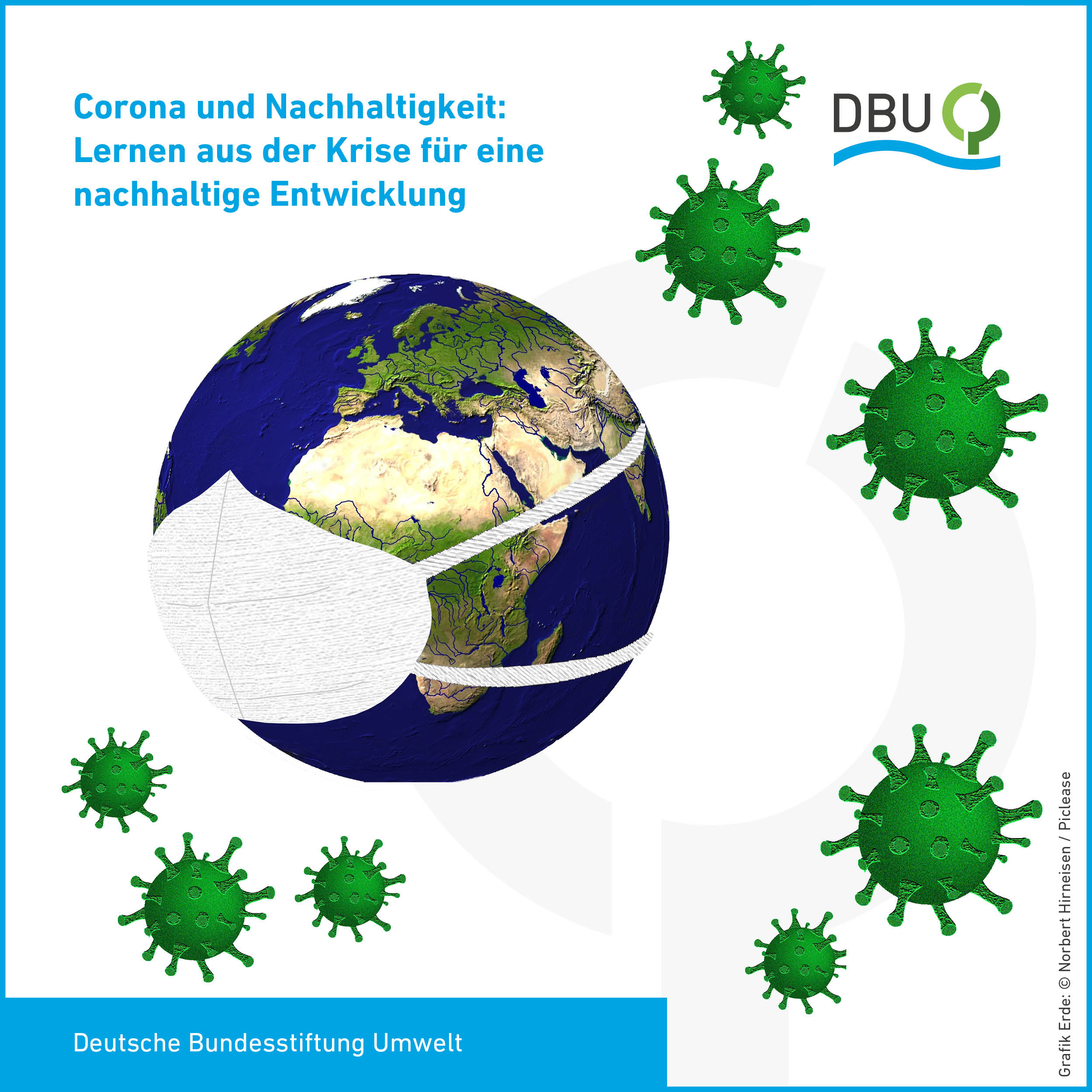Sustainability in the Corona Crisis – Learning from the Crisis for Sustainable Development
As a result of the Corona pandemic, we are experiencing massive restrictions in everyday life – with corresponding effects also on existing climate and environmental goals. The current debate is whether and how the Covid 19 crisis is impeding or promoting climate-friendly economic transformation.
The DBU is funding a number of projects that address the impact of the Corona Crisis and its consequences for achieving environmental and climate goals and corresponding approaches to solving the problem. The goal of this funding initiative is to look at the situation in the aftermath of the pandemic from different scientific perspectives. The systemic, inter- and transdisciplinary studies will also contribute, among other things, to understanding human behavior and the psychological effects that cause the radical changes. It also analyzes how current programs of measures, for example to stimulate the economy, would have to look in order to be able to support a sustainable transformation. The results of the projects should provide information on how the resilience of society to future socio-ecological crises can be strengthened and how and which behavioral changes and measures can promote the “great ecological transformation”.

Projects, publications and lectures
For more information on the funded projects, please visit the project pages:
- “New Economic Education to Shape Complexity in Times of Crisis,” Cusanus University of Applied Sciences.
- “Green Recoverthon – Participatory Consensus Mobilization,” DENEFF.
- “Market-State-Civil Society Balance for a Resilient Society,” IÖW.
- “Sustainable Economic Stimulus to Address the Corona Crisis,” Öko-Institut.
- “Environmental Awareness and Risk Perception in Times of Corona,” Bielefeld University.
- “Stress test resilient neighborhood”, University of Bremen
- “The Corona Crisis as a ‘Gamechanger’ for the Transformation to Sustainability?”, University of Magdeburg.
- “Community-based approaches for pandemic resilient neighbourhoods”, Wuppertal Institute.
You can also read more about “Corona & Sustainability” and the DBU funding initiative in the following publications:
- Corona and Sustainability – Learning from the Crisis for Sustainable Development, edited by Dr. Cornelia Soetbeer and Prof. Dr. Markus Große Ophoff, oekom Verlag, Volume 16 from the DBU Environmental Communication series. The final results of the DBU funding initiative are summarized in this book. Also in view of the current crisis – the Ukraine war – this book provides many suggestions for more resilience in society.
- Corona – Stimulant for the Great Transformation?, oekom-Verlag, with a contribution by Dr. Cornelia Soetbeer, Head of the DBU Department of Environmental Communication and Cultural Property Protection, and Prof. Dr. Markus Große Ophoff, Technical Director of the DBU Center for Environmental Communication.
- The role of foundations during a Pandemic, Global solutions journal ISSUE 6, by Dr. Cornelia Soetbeer, Head of the DBU Department of Environmental Communication and Cultural Property Protection.
Lecture “The next crisis is sure to come – strengthening crisis resilience sustainably”.
At the conclusion of the DBU’s “Corona & Sustainability” funding initiative, Prof. Dr. Dennis Snower, President Global Solutions Initiative, gave a keynote speech on the topic of “The next crisis is sure to come – strengthening crisis resilience sustainably”. You can find the video recording of the exciting lecture here.
#DBUdigital Online Salon “Stimulus measures in the sustainability check”.
As part of the Öko-Institut’s project “Sustainable economic stimulus to overcome the Corona crisis”, the #DBUDigital online salon “Economic stimulus measures in the sustainability check” took place on June 8, 2020. You can find the video recording of the #DBUdigital online salon here. You can access the Öko-Institut’s presentation on the evaluation of the German government’s economic stimulus package from the #DBUdigital online salon here. Further information on the project as well as the final study on the project can be found here.
Results of the DBU surveys
To find out more about the views of German citizens on the consequences of the Corona crisis with regard to the issues of climate and the environment, the DBU commissioned a representative survey by the opinion research institute forsa Politik- und Sozialforschung. A key finding is that for the majority of the population, the climate crisis has a greater long-term impact on the economy and society than the Covid 19 crisis. The results of the DBU Environmental Monitor can be found here.
In parallel, an online survey on the same issues was conducted among DBU project partners. Here, the importance of climate and environmental issues was even more evident than in the Forsa survey. The results of this survey can be found here.
The results of the current (April 2020) and past (March 2020 and March 2018) representative surveys on the topic of “Digitization and Sustainability” can be found here.